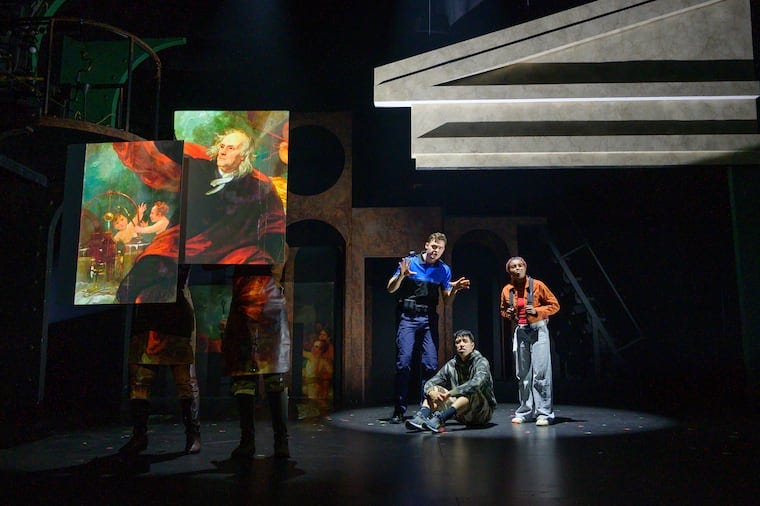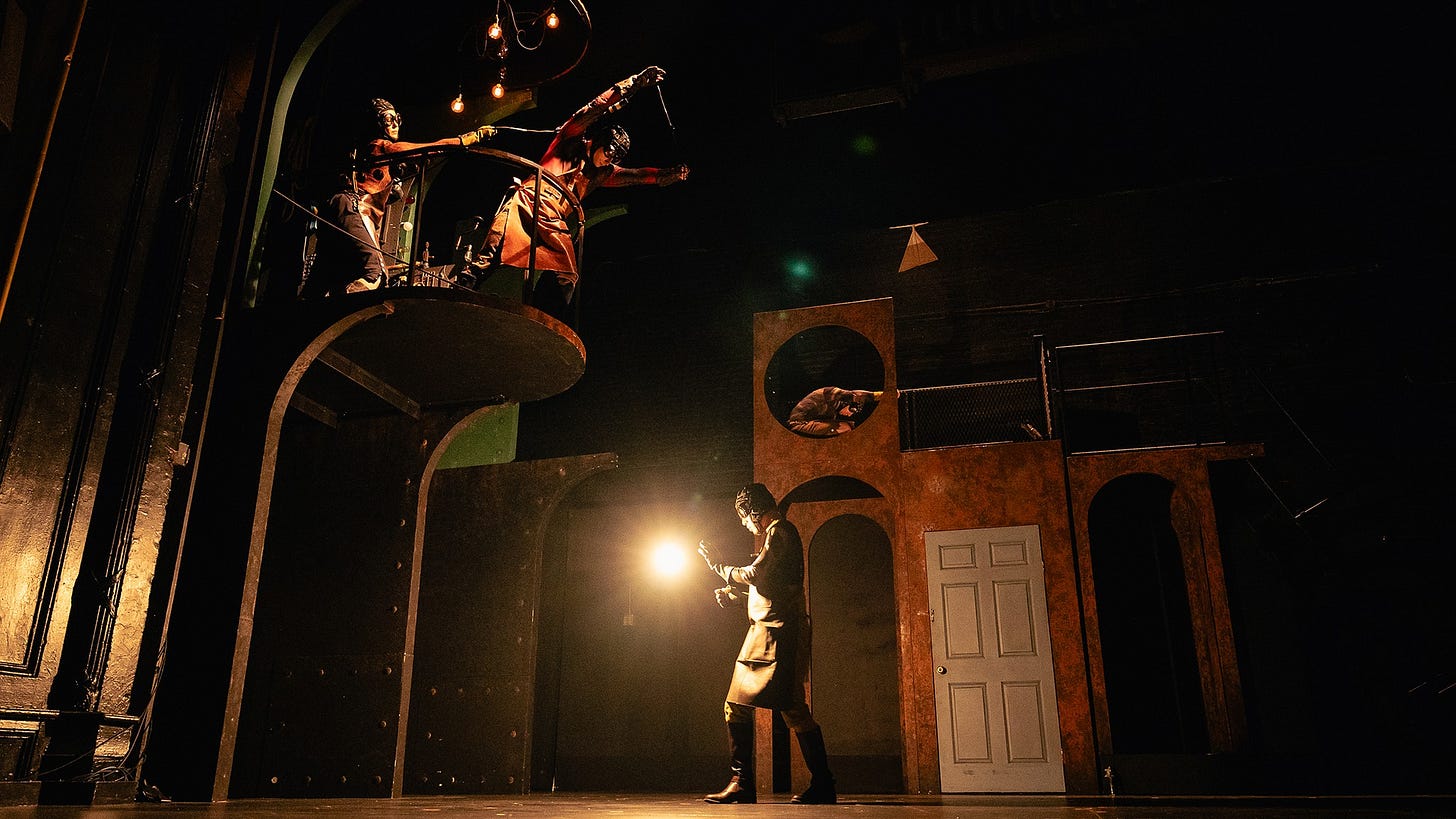Franklin’s Key
by Dan Rothenberg and Robert Quillen Camp
directed by Dan Rothenberg
Pig Iron Theatre Company, at Plays and Players through June 29
Not recommended, with redeeming qualities
Franklin's Key is a confused, confusing spectacle with an unlikeable protagonist and incomplete world-building. Though special effects sequences keep things going, very few of the play’s conventional scenes work on their own, so when the action slows down, the play grinds to a halt.
The largest problem with Franklin’s Key1 is that Rothenberg’s and Camp’s text, about teenagers discovering an underground Philadelphia filled with Ben Franklin’s secrets, is not good. I’m not going to go into all the minutiae of the plot, which often feels more like it’s checking boxes of things that go in children’s adventures as it builds scaffolding for action sequences rather than making thoughtful choices about the characters who populate its world and what motivates them. For example, the bad guy isn't evil enough. He often comes off as sympathetic, and the audience learns he’s the villain at about the same moment that one of the heroes does, cutting off obvious opportunities for the audience to root for—or be scared for—the good guys. This is one of a litany of problems. Chief among them, though, is that the protagonist is not only deeply unlikable, but inconsistently written.
Temple (Jameka Monet Wilson, who was an understudy and has done an admirable job taking over the role) is a high school dropout science-whiz who works full-time in an unspecified job but somehow also has the time and resources to enter a teen science competition, the kind of thing that typically only high schoolers enter, is given a tragic backstory (check!). Her mother died and she has to run the household and take care of her younger brother, musical prodigy Arturo (Alton Alburo). So they’re orphans (check!). This supposedly defines her, to the point where she harbors deep resentments towards her brother. Yet Temple consistently acts rudely, carelessly, or even recklessly, towards her “little mouse,” and consistently chooses adventure and even power instead of caretaking and responsibility, despite explicitly defining herself that way. In an early scene, set at her home with Arturo, she discovers she can magically control a device she’s found and it is Arturo who grows worried as Temple seems to get drunk on the power. She's also mean to her ex. She sucks, and it's weird that despite having won a $5k prize in the science competition that opens the play, which gets Arturo excited about the idea of being able to buy a sandwich, money is never again mentioned as a motivator, or at all—the kind of simple thing that could ground what happens over the ensuing two and a half hours. Because this character is so underdeveloped, and because she's a jerk, the stakes of the show are never high. Even when they're dealing with the bad guy trying to conquer the world or whatever, it's not grounded to any emotional truth or depth.
Missed opportunities to build suspense and dramatic irony abound, Rothenberg's direction seems uninterested in these concepts. The only thing that's gotten adequate attention is spectacle. The scenes that are driven by dialogue rather than action are exposition heavy and often lack detailed staging, especially when it's a scene of just a couple people talking to each other, unaided by special effects. This serves as a weak scaffold for the action sequences and visual effects, which are mostly cool and fine and work well (“magic” and visual effects here are under the direction of Skylar Fox), even the retro 1950s style cardboard robots. But when something like that isn't happening, save for a few short scenes anchored by strong players like Izzy Sazak, Benjamin Bass,2 and Alice Yorke (notably all Philly actors) the play grinds to a crawl.
Despite significant amounts of explanation, key bits of exposition—like what “bio-ether” is, some kind of energy, apparently halfway between orgone energy and The Force (check!) that the New Prometheans, the secret society (check!) guarding Ben Franklin’s secret legacy, are charged with managing (check!) or how old Temple’s ex-boyfriend Richard the art Museum security guard is—are never mentioned or are delivered like they’re unimportant, throwaway lines.
This “bio-ether” builds up in the city as a naturally occurring force, yet also needs to be purged, like it's some sort of electrical miasma that must be bloodlet in a retro-futuristic ritual that serves no dramatic purpose except maybe to establish this group of people as Doing Something Important and, ofcourse, to Be A Cool Effect even as it makes the bio-ether itself make no sense. This is representative. The play is more scaffolding for Cool Things to happen than it is a dramatic structure itself. This could be fine, it often is, but there's a lack of coherence and internal logic, the scaffolding is more like a rickety ladder or heap than a sturdy structure.
The casting feels strange, even accounting for doubling in the ensemble. Pig Iron intentionally sought actors of color (check!), especially for the lead roles of Temple and Arturo, but the actors of color in the ensemble only occupy bit speaking roles, leaving the Philadelphia of the play still feeling majority-white. Though paying attention to one kind of diversity, Rothenberg’s wise New Prometheans are all played by thirty somethings or so, and though Izzy Sazak’s Persephone comes off middle aged, Alice Yorke’s Diane Prentiss doesn't read as older at all, despite a bright gray bob of a wig. A shame, since there are often few roles out there for older women. And for a show that seems in part a love letter to Philly, I don’t understand why the leads were all cast out of New York (or were, until Temple was replaced). Monet Wilson as Temple looks believably young to be someone who should be about to graduate high school, Alburo as her younger brother looks like a 20 something and plays like a tween—though dialogue suggests he’s maybe a junior. Jacob Orr, as Temple’s ex-boyfriend Richard, however, is not fooling anyone and seems very much an adult, complete with an adult job as a security guard at the Museum of Art, giving an uneasy color to his relationship with Temple.
Lighting design by Amith Chandrashaker and Stoli Stolnack does its job, except when lights pointed at the audience blind us on multiple occasions, the one effect that sucks. The show sounds good, designed by Chris Sannino and with a score by Rosie Langabeer (with Josh Machiz and Gregg Mervine). The set by Anna Kiraly is functional, though a high balcony downstage right looms tends to loom over the stage even when it’s not being used. Video design by David Tennent and Joshua Higgason is effective, but is inconsistently utilized and occasionally aesthetically discordant, with a new style coming out of nowhere.
Maiko Matsushima’s costume design is mostly fine, but her Richard is more mall security than museum guard in a blue and black polo, and her Gogglers (the show’s movement ensemble) in brown and red striped tops beneath their goggles and leather aprons come off a little like steampunk Freddie Krugers, though they also look like dark, serious versions of Minions (if only they were also Minion-like in behavior, the show would be much more fun). The Gogglers themselves, Ben Grinberg, Makoto Hirano, and Devon Sinclair (who each fill in for bit parts), are joined at times by other players and do fine work. Their choreography (presumably a mix of Rothenberg’s direction and Fox’s sfx work) is sometimes is very cool, sometimes is eh, and sometimes they’re glorified stagehands, as they lack personality. Sometimes the Goggler stuff and their effects, however cool, feels unintegrated into the narrative or dramatic structure of the piece, serving only as visual or physical world-building—one of the things I think of when I think of Pig Iron, but it doesn’t cohere as storytelling.
Among these credits in the program, I was surprised to find a dramaturg, Michael Barsanti, a former member of Pig Iron’s board and Ben Franklin enthusiast. Perhaps an enthusiast of new plays or action films would be better suited to the job.
At the end of the play, Temple has a speech announcing the lesson she has learned (check!), that you can't do life alone, an example of how Franklin's Key tells rather than shows. She hasn't actually beaten the bad guy through teamwork or in community with other people, but operating a machine on her own because she has the right kind of magic, of “weird,” to do so. Ditto for Arturo the cellist, who steps in at a crucial moment to rescue Temple, her mission accomplished but in a bind, by piloting the (spoiler alert) Wanamaker organ as a giant robot-assemblage all by himself—a notoriously complex instrument that in the real Philly may even have two people operating it, one playing it while the other works the stops. Shows for children don't need to be about children. Maybe it isn’t odd to make a kids show about teenagers, but I think it is weird to make a show for young audiences with teen protagonists that doesn’t try to explore any of the issues that kids or teens actually face. Sure, there’s lip service at the conclusion to needing each other and not being a self-serving person like the villain, but this is a lesson that Temple shouldn't even have to learn because they are, on the show's own terms, defining character traits.
The production, the whole concept is baffling—all this spectacle to say what, to entertain who? I still have no idea who the intended audience for this play is. Temple’s talents, scientific and magical, are repeatedly credited to her being “weird,” as if to reify difference as difference. It’s a shame that this question of difference, the feeling of being other, of not fitting in one way or another, a thing that’s such a common experience, is never explored beyond the platitude that the things that make you different might be your strengths.
The first of a couple disclosures I should make writing this piece (and a reminder that Plays Unpleasant is not a neutral journalistic project, but the project of an interested artist writing about a medium he works in). I auditioned for Franklin’s Key.
In college, I was assistant director on a show Bass was in.







